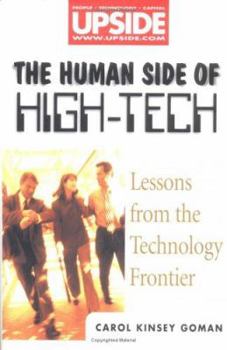The Human Side of High-Tech: Lessons from the Technology Frontier
"If you want to create an enthusiastic, committed, high-performance workforce today, think democratic. Think equal. Think ''everyone''s as important as I am. ''Think ping-pong tables,company picnics,... This description may be from another edition of this product.
Format:Hardcover
Language:English
ISBN:0471344222
ISBN13:9780471344223
Release Date:January 2000
Publisher:Wiley
Length:230 Pages
Weight:1.08 lbs.
Dimensions:0.8" x 6.4" x 9.2"
Customer Reviews
1 rating
The Early Stages of an Experiment
Published by Thriftbooks.com User , 24 years ago
There are several reasons why I rate this book so highly. Here are three: Goman provides an in-depth analysis of HOW various high-tech companies are creating a decisive competitive advantage for themselves by attracting and keeping superior talent; she explains HOW virtually all other organizations (including companies) can do so also; finally, she explains why companies such as Lotus, Cisco Systems, Autodesk, i2 Technologies, and PeopleSoft are "still in the process of evolving." Their individual efforts merely comprise a "beginning." She concludes that "...each company, with each experiment it undertakes, adds another building block lesson learned to the collective evolutionary process." It is commendable for Goman to provide so much valuable information and commentary. It is also commendable that she includes a caution that, in the immortal words of Paul Williams, "We've only just begun."Various "lessons" to be learned from "the technology frontier" are carefully organized and then developed. In Chapter 1, for example, Goman lists what she calls "The Eight Commandments of High-Tech Culture": 1. Egalitarianism, 2. Freedom, 3. Informality, 4. Trust, 5. Responsibility, 6. Teamwork, 7. High Performance, and 8. Fun. The challenge is to optimize all eight in the most appropriate balance. She concludes the chapter with the first of several lists of Lessons" which will inform efforts to meet that challenge. For me, one of the most valuable chapters is Chapter 6: "Thriving on Change, Complexity, and Chaos." In it, Goman analyzes how and why several companies have succeeded amidst the "extreme volatility" of continuous restructuring by accepting "constant adaptation to new situations as a fundamental of survival and prosperity." At the end of this chapter, Goman provides another series of "Lessons" which are eminently sensible. Goman agrees with Debra Engel (former head of HR at 3Com) that it took four hundred years for business organizations to operate successfully in the Industrial Age. "We are only beginning to understand how to operate in the "Information Age." In essence, that is the challenge which Goman's brilliant book addresses with eloquence as well as insight. I agree with her that "organizations don't change. People do -- or they don't." If all this seems relevant to you, I urge you to buy this book, read it carefully, and then review (at least every month or two) the various lists of "Lessons." If you are determined to be a change agent in your own organization and it refuses to support your efforts, I presume to suggest that you find another which will.




